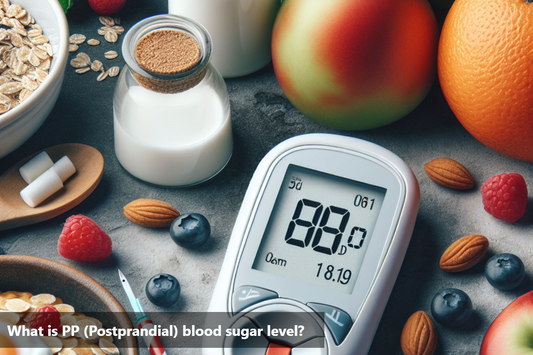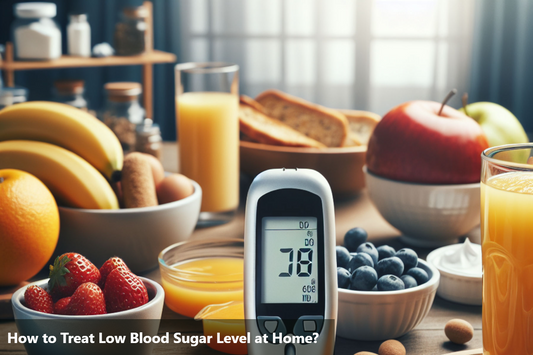In the complex dance of our body's functions, the sugar levels in our blood play a big part in keeping us healthy. When we talk about "blood sugar," we're referring to the amount of glucose in our bloodstream, which is an important energy source for our cells. But maintaining the right balance of this sugar is crucial, and our body has different ways to make sure it stays in the right range.
Let's meet insulin, the unsung hero in this body performance. Made by the pancreas, insulin helps our cells take in glucose and use it for energy. Without insulin, our cells would miss out on this essential fuel, causing various health problems.
In this journey, we'll look into the normal range of blood sugar levels, showcasing how our body is pretty good at keeping things in check without outside help. However, we'll also talk about times when this self-regulation doesn't work well, and we need to bring in insulin. As we explore this, our goal is to give you knowledge and insights into when insulin becomes crucial in maintaining a delicate balance.
Normal Blood Sugar Levels
Inside our body, keeping our blood sugar levels in check is like a well-coordinated dance. Usually, a healthy range for blood sugar is between 70 to 140 milligrams per deciliter (mg/dL). This range shows how our body is pretty good at regulating itself.
When we haven't eaten for a while, like in the morning before breakfast, our blood sugar levels tend to be at the lower end of this range. The body cleverly manages its glucose (sugar) supply to meet basic energy needs, showing how amazing our system is at maintaining stability without needing insulin right away.
Time of Measurement |
Normal Blood Sugar Levels (mg/dL) |
|---|---|
Fasting (before eating) |
70 - 99 |
1-2 hours after meals |
Less than 140 |
Before Bedtime |
90 - 130 |
After we eat, our blood sugar levels might go up, but the body has a plan. The pancreas releases insulin to guide glucose into cells, where it's used for energy. This back-and-forth between glucose and insulin demonstrates the body's natural talent for keeping things in balance.
Knowing these normal blood sugar levels is important because it helps us appreciate how our body naturally stays in harmony. It shows that our body can handle its energy needs without outside help. Recognizing when things deviate from this normal state is crucial. That's when interventions, like insulin, might be needed.
When Insulin May Be Required
In the world of health, our body's natural balance can face challenges, and insulin plays a big role in fixing this balance. One main issue is diabetes, where the body struggles to control blood sugar properly.
Type 1 diabetes, often found in kids, happens when the immune system attacks and destroys insulin-making cells in the pancreas. Without insulin, blood sugar levels can go up, needing help from outside to prevent problems. People with Type 1 diabetes need insulin shots to help cells absorb glucose.
-
Type 2 diabetes, more common in adults, is when the body doesn't respond well to insulin. Even if the pancreas makes insulin, it's not very effective in helping glucose get into cells. In these cases, medicine, lifestyle changes, and sometimes insulin are needed to control high blood sugar.
Time of Measurement
Target Blood Sugar Levels (mg/dL)
Fasting (before eating)
80 - 130
1-2 hours after meals
Less than 180
Before Bedtime
100 - 140
Insulin is also important for health issues other than diabetes. Some hormonal problems, infections, or medications can upset the balance, causing higher blood sugar levels. In these situations, insulin is a crucial tool to fix the imbalance and keep overall health in check.
Understanding when insulin is necessary, whether for diabetes or other health problems, gives us the knowledge to know when to step in. Recognizing the causes of high blood sugar levels, whether from diabetes or other issues, helps us take a proactive approach to our health and shows how insulin helps keep our body in balance.
At What Blood Sugar Level Should Insulin Be Given?
The decision to administer insulin and the specific blood sugar levels at which it should be given depend on various factors, including the type of diabetes, individual treatment plans, and the advice of healthcare professionals. Here are some general guidelines:
Type 1 Diabetes
Basal Insulin: Often administered daily to maintain a baseline level of insulin.
Bolus Insulin: Given before meals to manage blood sugar spikes. The amount of bolus insulin is calculated based on carbohydrate intake and current blood sugar levels.
Correction Doses: Administered when blood sugar levels are higher than the target range. Correction factors (insulin sensitivity) are used to determine the dosage.
Type 2 Diabetes
Insulin may be introduced when other medications (like metformin, sulfonylureas, or GLP-1 agonists) are not sufficient to control blood sugar levels.
The decision to start insulin is individualized and based on factors such as HbA1c levels, fasting blood glucose levels, and the presence of symptoms or complications.
General Blood Sugar Levels for Insulin Administration
Fasting Blood Sugar: If consistently above 130-150 mg/dL despite oral medications, insulin may be considered.
Postprandial Blood Sugar (1-2 hours after meals): If consistently above 180-200 mg/dL, insulin might be needed.
Random Blood Sugar: Levels above 200-250 mg/dL might prompt insulin use, especially if accompanied by symptoms of hyperglycemia.
Emergency Situations
Diabetic Ketoacidosis (DKA): Requires immediate insulin treatment. Symptoms include very high blood sugar levels (typically above 250 mg/dL), ketones in urine, and signs of acidosis.
Hyperosmolar Hyperglycemic State (HHS): Also requires urgent insulin administration. Blood sugar levels are often above 600 mg/dL without significant ketones.
Insulin Initiation and Adjustment
Starting Insulin: Initial doses are often conservative and adjusted based on blood sugar monitoring. Common starting regimens include basal insulin once daily or a combination of basal and bolus insulin.
Titration: Dosages are gradually adjusted based on blood glucose readings and targets set by a healthcare provider.
At What Blood Sugar Level Should You Not Take Insulin
In carefully managing blood sugar levels, it's important to know when it's not the right time to use insulin. One such situation is when blood sugar levels drop too low, leading to hypoglycemia.
Hypoglycemia, or low blood sugar, usually happens when there's too much insulin compared to glucose in the bloodstream. Giving insulin when blood sugar is already low can make this condition worse, possibly causing dizziness, confusion, and, in severe cases, loss of consciousness. It's like a delicate dance, and the timing of insulin is really important.
Healthcare providers typically recommend avoiding insulin if blood sugar levels are below 70 mg/dL. At this point, the focus switches from insulin to quickly raising blood sugar levels. Quick-acting carbohydrates, like fruit juice or glucose tablets, are the preferred way to rapidly counteract low blood sugar without adding more insulin.
It's also important to understand the risks of giving insulin when it's not needed. Using insulin unnecessarily can cause a fast drop in blood sugar levels and trigger hypoglycemia. This highlights the need to pay attention to the body's signals and realize when insulin isn't the right solution.
In dealing with the complex world of blood sugar management, knowing when to skip insulin is just as important as knowing when to use it. By recognizing the risks and complexities involved, people can make smart choices and take a balanced and proactive approach to their health.
Administering Insulin only when necessary
We've learned a lot about blood sugar and insulin and how crucial it is to maintain a balance for good health.
Firstly, we looked at insulin's basic job of helping cells absorb glucose, which is essential for our body's energy. We also explored how our body usually regulates blood sugar on its own without needing outside help.
However, in diabetes, both Type 1 and Type 2, insulin becomes really important to handle high blood sugar levels. Other health issues can also mess with this balance, and sometimes insulin is needed for proper management.
When deciding when to use insulin based on blood sugar levels, it's essential to think about each person's unique needs. Even though there are general guidelines, the choice is specific to an individual's health and when intervention is necessary.
We also talked about situations where caution is crucial. Giving insulin when blood sugar is already low can be risky, so it's important to recognize signs of low blood sugar and know when it's not the right time for insulin.
Practically speaking, the main point is to consult with healthcare professionals for personalized advice. Whether it's deciding when to start insulin or when to skip it, getting guidance from a healthcare provider ensures a tailored approach that fits individual needs.
As we manage blood sugar, let's remember that insulin is a valuable tool, but it requires careful thought. By staying informed and seeking professional advice, we empower ourselves to make smart decisions that contribute to our overall well-being.
This Blog post is an initiative by DiabeSmart, to provide accurate and Nutritionist / Doctor approved information related to Diabetes. DiabeSmart is India's first Food brand designed specifically for Diabetics, that has been clinically tested on Diabetics and Pre-Diabetics to deliver 55% - 70% lower Sugar spikes. DiabeSmart is part of Lo! Foods - India's leading brand for Everyday Functional Health foods.







